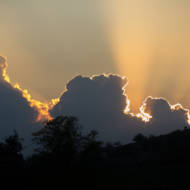
Why is it specifically the “clouds of glory” that are worthy of being commemorated on Sukkot? What about the other miracles?
One of the reasons that Jews dwell in a sukkah (hut) for seven days is in order to recall the “clouds of glory” that protected the Jewish people as they traveled through the desert for 40 years.
The question is asked: Why is it specifically the ”clouds of glory” that are worthy of being commemorated? Why do we not commemorate the other miracles that the Jewish people experienced while wandering the desert, such as the manna which kept them alive along with the constant supply of fresh water from Miriam’s well? Why were only the protective clouds singled out for remembrance?
One answer is that the miracles of the manna and the well had to do with sin. For example, there was a time that the Jewish people complained about the manna, as well as a time that they complained about the water, not to mention that water was the cause of Moses being forbidden from entering the Land of Israel. As such, there were no mitzvot (Torah commandments) instituted to recall these miracles. In fact, there was even concern that if we were to commemorate these items, we would thereby remind God of our ancestors’ sins.
Another answer offered is that God was “obligated” to give us “bread and water” for our very survival. It was expected. Not all parents give their children the most expensive toys and gifts, but all parents give their children basic food in order for them to live. Since this was something that God “had” to do, there is no mitzvah to commemorate it. The clouds of glory, however, were a luxury, not a necessity. But since He did provide them, we commemorate them.
The Zohar calls the sukkah “the shade of faith” and teaches that proper observance of the mitzvah of the sukkah has the ability to inspire us and bring us closer to God, and by extension, to keep alive the bond we forged with God over Yom Kippur well into the year ahead.
By: Rabbi Ari Enkin, Rabbinic Director, United with Israel

